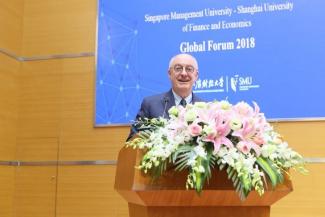
[Featured photo: SMU President, Prof Arnoud De Meyer shared his insights on ‘Becoming a Global Leader of Innovation- Perspectives from Singapore and China’ at the Global Forum.]
At the Singapore Management University (SMU)-Shanghai University of Finance and Economics (SUFE) Global Forum held on 20 Apr 2018, Singapore’s Consul-General in Shanghai, Mr Loh Tuck Wai commended SMU for its effort in collaborating with Chinese leading universities. He was confident that this partnership between SMU and SUFE would become one of many successful ones that Singapore has with Shanghai and China.
“Following Prime Minister Lee Hsien Loong’s recent visit to China covering Beijing and Hainan, he had also spent some time in Shanghai, where he updated himself on the latest innovation projects in the city and met with Shanghai Party Secretary Li Qiang. Both leaders affirmed the shared economic outlook and openness between Singapore and Shanghai, with a similar emphasis on education and human resource development. They also pledged their commitment to greater cooperation in the areas of cultural and people-to-people exchanges, science and innovation, and economic cooperation. I see SMU’s collaboration with SUFE fulfilling some of these goals set by our leaders,” said CG Loh in his welcome speech.
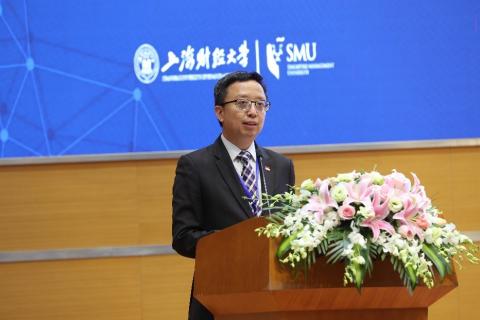
[Photo: Singapore’s Consul-General in Shanghai, Mr Loh Tuck Wai delivering his opening remarks as the Guest-of-Honour at the SMU-SUFE Global Forum 2018.]
Themed ‘Becoming a Global Leader of Innovation- Perspectives from Singapore and China’, the SMU-SUFE Global Forum 2018 provided a dialogue platform for distinguished scholars from both universities, senior government officials and business leaders to exchange views, discuss issues and share findings on this timely topic relevant to both countries.
As one of the four keynote speakers for the forum, SMU President, Prof Arnoud De Meyer shared his observations as an expert in Innovation Management. He highlighted that the traditional sources of GDP growth were receding in the Chinese economy, namely an ageing population; mercantilism in the USA, which hampered export-driven growth; and declining macroeconomic returns on fixed asset investments. As such, the Chinese government had recognised the need to innovate and rolled out a “Made in China 2025” strategic initiative in mid-2015 to comprehensively upgrade the Chinese industry and move the country’s manufacturing up the value chain to focus on high-tech fields.
For example, China had performed well in process and product engineering-based innovation, as well as customer-focused innovation in products, services and business models. As such, it was likely to become an innovative leader in the future. Notwithstanding, there were deeper issues worth pondering, in particular, science-driven inventions and innovation - two areas where China was lagging behind. He added that although there was a huge difference between Singapore and China in terms of the size of land and economies, China’s emerging innovators could learn valuable lessons, as well as draw inspirations, from Singapore’s experience.
In an exclusive interview with Lianhe Zaobao post-Forum, Prof De Meyer was asked to give his comment on the escalating threat of a trade war between China and the US. He said that China's rapid progress and significant investments in fields such as artificial intelligence had posed a threat for the US. The escalating trade disputes were just the tip of the iceberg of the intense contest for supremacy between the two countries in advanced technologies and in innovation. These might turn into an arms race between China and the US in the 21st Century. He noted that beneath the trade skirmish, an even bigger war in science, technology and innovation between the two countries was brewing.
Prof De Meyer also shared his view that China could be the pacesetter for global innovation in the future. “This is not because China has a huge market, but the Chinese consumers will be leading the trend in embracing new technologies in the next 10 years. They are eager and willing to experiment with various new things. Singapore companies could perhaps observe the Chinese market and learn from its shift, so as to develop products that can be sold to South East Asia and other parts of the world.”
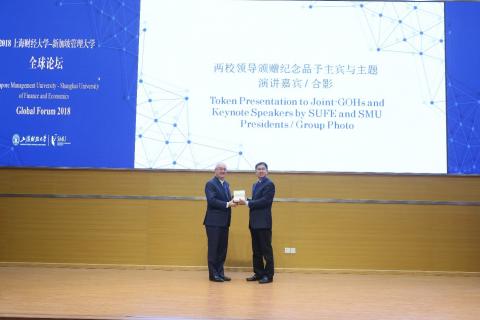
[Photo: SUFE President, Prof Jiang Chuanhai presenting a token to SMU President, Prof Arnoud De Meyer at the SMU-SUFE Global Forum 2018.]
The other three keynote speakers were Mr Xu Jianguo, Member of the Board of Governors, SUFE and former Director, Shanghai Municipal Economic Commission; Mr Aylwin Tan, Chief Customer Solutions Officer, Ascendas-Singbridge Pte Ltd and Prof He Xiaogang, Assistant Dean, SUFE College of Business.

[Photo: (From left) Keynote speakers at the SMU-SUFE Global Forum 2018 included Mr Xu Jianguo, Mr Aylwin Tan and Prof He Xiaogang.]
In the afternoon, SMU Vice President (Business Development), Prof Annie Koh chaired a Roundtable on “Innovation, Entrepreneurship and Urban Competitiveness”. Invited panelists from both Singapore and China concurred that innovation was the key driving force for urban competitiveness. The dialogue participants then articulated their views from different perspectives in their own professional capacities.
Prof Cheng Qiang, Dean of SMU School of Accountancy, noted that it was critical for R&D and talent grooming to be underpinned by a long-term strategic vision. In addition, the financial market also played an important role in promoting innovation and entrepreneurship.
Dr Cheong Wei Yang, Deputy CEO, National Research Foundation, Prime Minister’s Office shared that the Singapore government had been focusing on building the country’s fundamental research capability. He believed that when the SMEs (Small-and-Medium Enterprises) introduced new technologies to the market, not only would these disrupt the way that large companies ran their business, they would also generate a positive impact on the society and inject fresh impetus for greater innovation and entrepreneurship.
Mr Eason Liu, Partner, N5 Capital Co Ltd and President of SMU Alumni Beijing Chapter, gave his take on the topic based on his own business experiences. He noted that a good system of governance would provide entrepreneurs with an improved competitive mechanism and a more conducive environment for doing business.
Panelists from China included Prof Zhu Chenggang, Member of the Standing Committee of the Revolutionary Committee of the Chinese Kuomintang and Member of the National Committee of CPPCC; Assoc Prof Yu Dianfan, Assistant Dean; and Assoc Prof Lin Nan, Head of Department (Strategic Management) - both of SUFE College of Business. They shared Shanghai’s experience in promoting innovation, as well as their personal opinions on how to foster an entrepreneurial spirit.
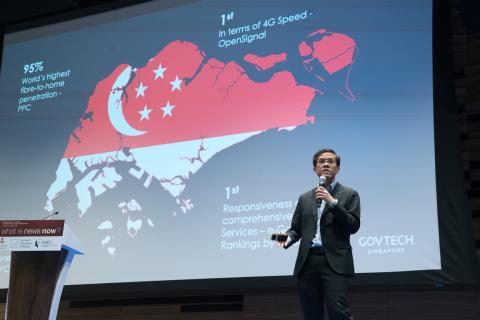
[Photo: (From left) The three panelists from Singapore were Prof Cheng Qiang, Dr Cheong Wei Yang and Mr Eason LIU. Each shared his views in his capacity as academic, senior official and business leader, respectively on the Roundtable topic, “Innovation, Entrepreneurship and Urban Competitiveness”.]
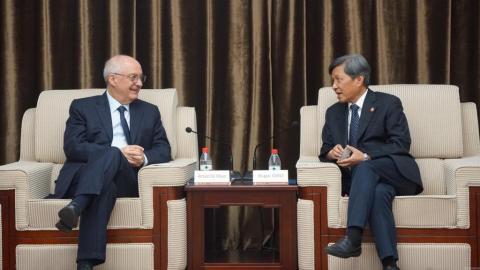
[Photo: Dr Cheong Wei Yang, Mr Eason LIU, Prof Cheng Qiang, Prof Annie Koh, Prof Zhu Chenggang, Assoc Prof Yu Dianfan and Assoc Prof Lin Nan participated in the Roundtable as panelists at the SMU-SUFE Global Forum 2018. Prof Koh was the moderator of the panel discussion.]
In her closing remarks, Prof Koh expressed delight in witnessing the enhanced collaboration between SMU and SUFE through this jointly organised event. She emphasized to the audience that in this era, cooperation was more vital and necessary than competition. She encouraged students to stay agile and brave, but not reckless in times of rapid changes and to collaborate more in the face of challenges, rather than operating independently.
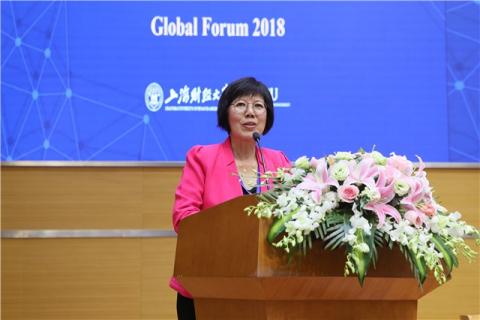
[Photo: SMU Vice President (Business Development), Prof Annie Koh encouraged all students to embrace an entrepreneurial spirit in her closing remarks at the SMU-SUFE Global Forum 2018.]
Some 250 guests attended the 7th edition of this annual signature event of SMU held at SUFE’s Entrepreneurship Centre. It also attracted a good turnout from the press, with journalists from both Singapore and Shanghai media agencies like Lianhe Zaobao, Xinhuanet Singapore, Shanghai Education TV and Shanghai Youth Daily reporting on the SMU-SUFE Global Forum. The event was also streamed live in China by 36Kr, a Chinese online platform offering news about technology and start-ups – the mainland equivalent of TechCrunch in the US.
Leveraging on the joint event, the Accountancy schools of SMU and SUFE inked a new collaboration agreement on SMU’s Master of Science in Accounting (Data and Analytics) programme. Faculty from both institutions also explored potential areas of collaborations at an interest-matching discussion. An information session conducted by Assoc Prof Themin Suwardy, SMU’s Dean (Postgraduate Professional Programmes) was held for a group of SUFE students after the conclusion of the forum.
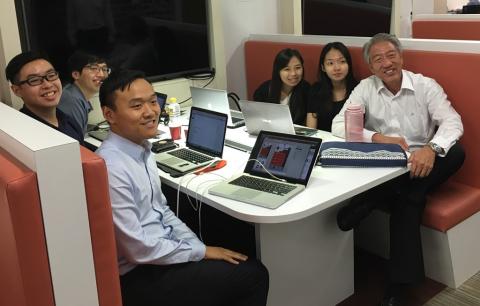
[Photo: Dean of SMU School of Accountancy (SOA), Prof Cheng Qiang (front row, left) and his SUFE counterpart, Prof Li Zengquan (front row, right) inked a new agreement on collaboration in SMU’s Master of Science in Accounting (Data and Analytics) programme. The signing ceremony was witnessed by (from left to right, standing) SOA Assoc Prof Wang Jiwei; SMU President, Prof Arnoud De Meyer; Singapore’s Consul-General in Shanghai, Mr Loh Tuck Wai; SUFE President, Prof Jiang Chuanhai; Chairman, CCPIT Shanghai, Mr Yang Jianrong and Associate Dean of SUFE SOA, Prof Zhu Kai.]
All photos courtesy of SUFE.